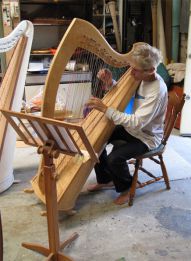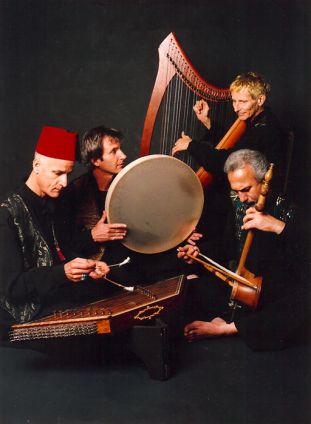Donald Hall

Donald Hall was born in the Mareeba Base Hospital in Far North Queensland, one of identical twins, on November 18th. 1953. This was the closest hospital to Normanton, way up on the remote Gulf of Carpentaria, where the family lived at the time.
Although beginning his musical education on a piano accordion given to them by an opera singer aunt who had gone deaf, he moved to piano and violin, finally studying cello at the Queensland Conservatorium with Julie van der Klei, as well as doing a couple of degrees in psychology and anthropology at the University of Queensland
Upon graduating, Donald went into the public health system to become the first music therapist to work in the public hospitals of the state. He traveled widely holding training sessions and lectures on music therapy for the State Health Department and the Education Department, as well as establishing clinical sessions in three of the major metropolitan hospitals covering the fields of aged care, post-operative rehabilitation and both adult and the then very new field of child psychiatry. He served for many years as the secretary of the Music Therapy Association, and along with musician Moya Evans, psychologist Cathy Brown, nursing superintendent Helen Menzies, conductor Brian Stacey and physiotherapist Lynn Thompson, managed to organize a number of national conferences and establish a full course in music therapy at the University of Queensland.
After this he moved into the theatre, which went on to consume the major part of his career. Working first as a repetiteur and arranger, he has gone on to compose the scores to over one hundred and fifty productions, ranging from full operas through to hip hop settings of Shakespeare. He has composed music for productions with most of the major theatre companies and festivals in Australia, including the Queensland Theatre Company, the Sydney Theatre Company, The Melbourne Theatre Company, Malthouse Theatre, Melbourne, Belvoir Street Theatre, Sydney, Adelaide Festival, Sydney Festival, Perth Festival, Brisbane Festival, Queensland Opera, and for twenty years was music director for Bryan Nason’s celebrated touring Shakespearean company Grin and Tonic. Outside Australia, he has written music for the National Theatre, London and the Royal Shakespeare Company. He played piano at the Savoy and the London Fields Pub, read Philosophy at Oxford and was a tutor for singers at the Madrid Conservatorium.

Away from theatre he has composed for Channel TenTelevision, SBS Television and ABC Radio. His favourite scores from his time in the theatre were a massive score for Bertholdt Brecht’s Caucasian Chalk Circle, commissioned by the Queensland Performing Arts Trust, Shakespeare’s The Tempest, commissioned by Paul Sherman and the Brisbane Arts Theatre, and Garcia Lorca’s Bodas de Sangre, commissioned by the Queensland University of Technology. Shakespeare has been his constant colleague, and he has composed four different scores for productions of Hamlet, six scores for MidsummerNights Dream, three scores for Macbeth, The Winter’s Tale, Twelfth Night and The Tempest as well as duplicates of most of the remaining comedies and tragedies, and dozens of silly setting of the songs of Shakespeare for schools, in the style of Elvis, Madonna etc.
During this time he was appearing frequently as a solo pianist in recital series at the Queensland Performing Arts Centre, where he had the distinction of performing solo more often than any other artist in the Twentieth Century.
He came to the harp through theatre, having composed the score for the Queensland Theatre Company’s enormous twenty-first anniversary production of The Epic of Gilgamesh for well-known Australian harpist Mary Doumany, whose fee was so high that the administrator suggested to me that it would be cheaper to buy a harp and learn to play it oneself before the show opened. Which is what happened. The resultant press reviews were so overwhelmingly favourable, that he began playing more frequently, eventually adding little bits of harp to his piano recitals. He has since gone on to perform as a harpist in theatre, opera, ballet and concert. and record the European repertoire with quartet Viva La Musica, the Celtic repertoire with the trio Paddytown and the Persian repertoire with the Middle-Eastern quartet Khidir. He has supported international artists such as Stephane Grapelli, Otmar Liebetz, Marianne Faithful and The Chieftans during their Australian tours.
He began playing the chromatic harp after seeing Andrew Lawrence King, the English harpist and scholar, who with his group The Harp Consort, toured Australia in the early nineties, giving concerts and masterclasses. After playing in the renaissance style of the Spanish method and exploring that repertoire for a number of years, he changed his technique over to the French style, with the advice of Madame Francette Bartholomee, one of the twentieth century’s major performers and teachers on the chromatic harp, as well as receiving invaluable guidance from Professor Florence Sitruk from the Geneva School of Music.
He has performed on the chromatic harp, in solo, duo and ensemble capacities in many concerts over the past ten years, including nationally at the Adelaide Festival, The National Sacred Music Festival, the National Shakespeare Festival, the International Shakespeare Congress, the National Harp Festival and the Woodford Music Festival. Along with colleague chromatic harpist Nicole Denington, Spanish guitarist Andrew Vievers, cellist Danielle Bentley and percussionist John Thoms, he performed Ribayez’s seventeenth century suite of court dances in concerts at the University of Queensland, City Hall and the Woodford Festival. He used chromatic harp in composer Kim Cunio and Soprano Heather Lee”s Temple Project, a reconstruction of the music of the ancient Temple of Jerusalem, and has used it extensively over the last six years in performing the Persian classical and traditional repertoires, firstly with the quartet Khidir, with Ceiavash Arean, Ben Kashi and James Coates, then later with the quintet Noor, made up of Ceiavash Arean, Siroos Alavi, Amir Naderi and soprano Dania Cornelius. The harp, once a standard part of Persian music, fell into disuse with the advent of Islam, and the music of these two groups has been one of the only places in the world where you can actually hear the full complement of Persian instruments. The chromatic harp is ideal for this style of music, particularly because you can tune quarter tones on the pentatonic row, without effecting the tuning of the other row of strings.
Locally, he has performed on the chromatic harp at all the major performance venues of the city, (the Queensland Performing Arts Centre, City Hall, The Powerhouse etc.) as well as in a series of concerts in twenty of the city’s municipal libraries sponsored by the City Council. He has taught for many years at the Queensland University of Technology, working in the Music Department and the Drama Department where he teaches courses in music theatre and musicianship as well as voice studies. He has also worked variously as an orchestral cellist, a choir conductor, Gipsy accordionist and church organist, to make ends meet. His C.D’s include “CREATION” featuring actress Diane Cilento and flautist Jane Rutter, “Classical Moments” “Celtic Harp” “KHIDIR” and “Santa’s Favourite Songs.” Away from music he has been a writer, and has penned seven plays that have been produced and a book of Persian literature, containing his translations of seventy of the poems of Thirteenth Century Persian mystic Hafiz, a new translation of the Rubaiyat of Omar Khayyam, and a totally new translation and re-edition of the 2,500 year old Hymns of Zarathustra.
His plays include “Eccentrics”, based on the book of Dame Edith Sitwell, three comedies for the Supernumeraries, a group of five deeply talented disabled women; “Ladies in Waiting”, “Acting Up” and “Angels, Unicorns and Other Mythological Creatures”, an all-girl script for the Education department-“ The Heroine Trade” and two one woman shows for the internationally known Australian cabaret and comedy singer/performer Annie Lee-“ Transformations” and” Stained Glass Windows.”
He has received awards for his contribution to music in the areas of theatre, therapy and the community.
He lives in Brisbane, Australia, with his cat Jellybean.
